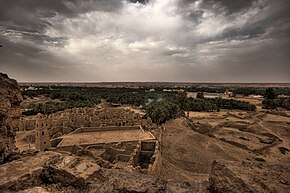Dumat al-Jandal
| دومة الجندل | |

The ruins of the ancient city of Adummatu
|
|
| Location | Al Jawf Province, Saudi Arabia |
|---|---|
| Coordinates | 29°48′41.1″N 39°52′5.9″E / 29.811417°N 39.868306°ECoordinates: 29°48′41.1″N 39°52′5.9″E / 29.811417°N 39.868306°E |
| Type | Settlement |
| Site notes | |
| Condition | In ruins |
Dumat al-Jundal (Arabic: دومة الجندل) is an ancient city of ruins located in North Western Saudi Arabia in the Al Jawf Province; it is located 37 km away from Sakakah. The name Dumat al-Jandal means literally "Dumah of the Stone", since this was the territory of Dumah, one of the twelve sons of Ishmael. The city's ancient Akkadian name was Adummatu.
The city has a history dating back to the 10th century BC and is mentioned in Akkadian inscriptions of the Assyrian empire dating to 845 BC in which it is referred to as Adummatu and is described as the capital of an Arab kingdom, sometimes named as Qedar (Qidri). The names of five powerful Arab queens that ruled this city are known, among them Zabibe, Samsi, Tabua and Te'elhunu. The latter is also given the title of high priestess of Atarsamain, a deity of fertility, love and war associated with Ishtar. Dumat al-Jundal was the site of an important temple dedicated to Ishtar.
Excavations made by Khaleel Ibrahim al-Muaikel in 1986 added to observations made in 1976 that an homogenous layer of Roman-Nabataean pottery sherds indicating a prosperous community during the time of the Nabataeans to whom this realm of the region probably belonged.
In 106 AD, Dumatha was incorporated into the Roman Empire when the Emperor Trajan defeated the Nabataeans. Dumatha remained integral to the Limes Arabicus for over four centuries, serving as the easternmost settlement along the limes. In 269 CE, the place was mentioned by Zenobia, the Queen of Palmyra, as city with an immune fortress. After her forces had captured the city, the fortress of Marid withstood the attack in her revolt against the Romans. Later in the 5th century CE, the city became the capital of the kingdom of Kindah. In 633 CE, Khalid ibn al-Walid captured Dumat Al-Jandal and it became a part of the newly formed Islamic empire.
...
Wikipedia

